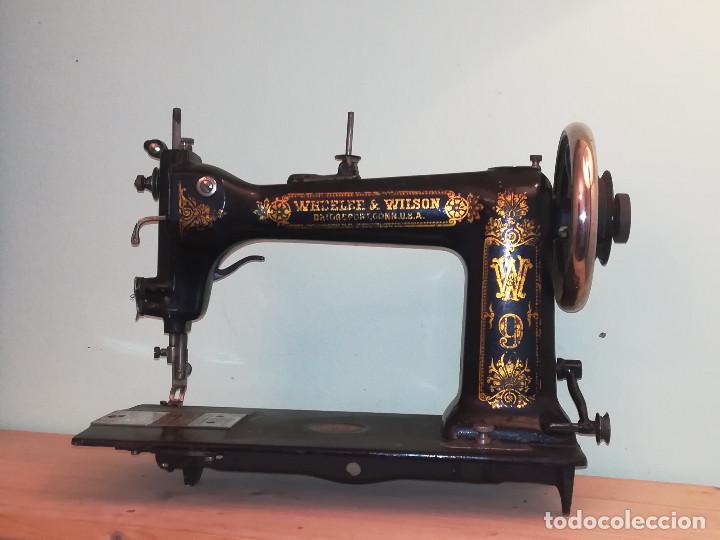Needles: The differences and progression from the early Wheeler & Wilson machines using a curved needle, the round needle of the Wheeler & Wilson 8 and the flat sided needle of the 9/D9. The Wheeler & Wilson 6, 7 & 8 use a Boye 27. The Wheeler & Wilson 9 uses a 127x1 / Boye 18. Wheeler Wilson D9 Sewing Machine Restoration Decals 41096. Wheeler Wilson D9 Sewing Machine Restoration Decals 41096. $59.95) SKU: 41096 UPC: Shipping: Calculated at Checkout. Current Stock: 4. Quantity: Decrease Quantity: Increase Quantity: Add to Wish List. Create New Wish List. Antique Sewing Machines are Not a Thing of the Past. Ranking the handle, the needle penetrates the fabric only as quickly as you can spin. Sometimes you need a blast from the past, and with an antique Singer sewing machine, you can get a blast all the way back to the 1850s.
A young Allen B Wilson constructed his first practical sewing machine in 1850, using a rotary hook mechanism. It worked very simply and very quietly. Turning the hand crank caused the bobbin to rotate in circles and during each revolution a hook picked up the top thread from the needle and twisted it with the thread from the bobbin to produce a stitch.
During an exhibition in New York, Wilson was introduced to the older Nathaniel Wheeler, who was at the time manager of the firm Warren, Wheeler and Woodruff of Watertown, Connecticut. They formed a partnership under the name of The Wheeler, Wilson Company to manufacture Wilson’s sewing machines. In 1853 the name was changed to the Wheeler & Wilson Manufacturing Company and a few years later it moved to a new factory in Bridgeport, Connecticut.
Wheeler & Wilson No. 4
To start with production was slow, however by the early years of the 1860’s it had increased from 20,000 to 30,000 and then 50,000 machines, peaking a decade later at over 128,000 per year. The company produced several models targeting specialist industrial work. As the Wheeler and Wilson Company launched new models, they issued them with numbers rather than names, clearly visible on the pillar. When the company changed from manufacturing machines with curved needles to new straight needle models they re-numbered the models. However some of the numbers were repeated i.e. the old machine model known as No. 5 became the new No.2.
The Wheeler and Wilson Company won several Prize Medals for their machines. These included the Industrial Exposition in Paris in 1861, the International Exhibition in London a year later and the Exposition Universalle in Paris in 1868, 1878 and 1889.
Most of the Wheeler & Wilson models were aimed at industrial use. The main domestic models were the Model 8 which was made from 1876 to 1887, and then the model 9 from 1877 to 1905.

The Model 8 was the first domestic sewing machine made by Wheeler and Wilson in large numbers. In total approx 600,000 were are thought to have been produced over an 11 year period.

There were 2 main variants of the Model 8's. The earlier machines utilised a large flat balance wheel, a gear driven bobbin winder and a volute tension spring. Later Model 8's changed to a gear driven hand crank, a rubber tyre bobbin winder and a beehive tension spring.
Wheeler & Wilson D8 - Early
Wheeler & Wilson D8 - Later
Volute tension spring
In 1888 the model 8 was replaced with the model 9, which was itself later upgraded in 1895 to become the D9, and then finally the Singer 9W after Singer took over the company in 1905.
Wheeler & Wilson D9
Wheeler & Wilson D9 - Balance Wheel
Wheeler & Wilson D9 - Bobbin Case
Wheeler & Wilson D9 - Throat Plate
Wheeler & Wilson D9 - Underbed
The Wheeler and Wilson domestic models 8, 9 and 9D used a unique 4 point case locking system, which was patented in 1879. Either a key or cranked lever operated 4 metal bars which slide out from the ends of the base to engage with the end plates of the case cover.
Wheeler & Wilson - Base
A London office was opened in 1859, at 13 Finsbury Place, followed a few years later by offices and showrooms in Regents Street. The Head Office was at Queen Victoria Street, London E.C. and by the 1880’s there were 26 other branches scattered around Britain. At the end of the century the UK Head Office was at 11 to 21 Paul Street, Finsbury, London.
With the decline in machine productions numbers, the Wheeler and Wilson Company was taken over by the Singer Manufacturing Company in 1905. Singer continued to manufacture the No.9 model, badging it as a Singer until after 1912.
.Wheeler & Wilson Attachments Box
(Photo courtesy Mike Anderson - Wolfgang's Collectibles)
Wheeler & Wilson D8 Attachments
(Photo courtesy Mike Anderson - Wolfgang's Collectibles)
$6.00
$8.00

QTY AVAIL: 2
$1.00
QTY AVAIL: 2
$10.00
$5.00
$6.00
QTY AVAIL: 2
$3.00
QTY AVAIL: 2
$6.00
$4.00
$15.00
QTY AVAIL: 2
$12.00
$10.00
$16.00
$16
$10.00
QTY AVAIL: 2
$5.00
$12.00
QTY AVAIL: 2
$4.00
$16.00
$6.00
Wilson D9 Driver
$20.00